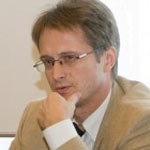- A
- A
- A
- ABC
- ABC
- ABC
- А
- А
- А
- А
- А
‘Roadmaps for the Development of All HSE Faculties and Campuses Will Be Released in the Near Future’
HSE University is beginning to implement its 2030 Development Programme. The first steps to achieving the new goals include major structural changes to the university’s faculties. HSE First Vice Rector Vadim Radaev spoke about the immediate plans that will be implemented in order to transform HSE.

Vadim Radaev
HSE First Vice Rector
HSE University issued an order regarding faculty restructuring. Could you elaborate on this order and its goals?
At the end of January, the HSE Academic Council approved HSE’s new 2030 Development Programme. We are now beginning to implement it, and we must begin at the faculty and campus levels. The order is not simply about restructuring; it’s about taking the first steps towards executing the new programme. But it is true that, as we pursue these new objectives, these steps include serious changes in the faculty structures.
The structural changes will take place gradually. This year, we are beginning with the Faculty of Business and Management, the Faculty of Law, and the Faculty of Humanities, where the demand for such change is most pressing. Next year, in 2021, they will be followed by the Faculty of Communications, Media, and Design; MIEM; and the Faculty of Social Sciences. In 2022, at the St. Petersburg campus, the Faculty of Economic Sciences and the Faculty of World Economy and International Affairs will undergo restructuring. And in 2023, it will be other faculties’ and campuses’ turn.
What are the key goals HSE hopes to achieve with these measures?
The goal is to form sustainable research teams that are internationally competitive and contribute to the achievement of national priorities. We are also developing a new educational model, which, according to the newly approved Development Programme, centres on project work with active student involvement. We want students to be involved in various types of projects beginning from the very first year of their studies. But to do this, we have to revamp the system of how our teachers and researchers work. Today, many colleagues, even very successful ones, feel increasingly isolated. We need to have basic teams and groups that unite staff, develop research fields, teach and develop degree programmes, but which, unlike our old departments, will be organized in a more flexible way, in accordance with their participants’ interests.
Currently, project work and research are already a requirement in students’ curricula. What is new about this?
The existing elements of curricula need to be filled with new content. This should be real project work, in which students, in teams or individually, solve certain relevant tasks, including those with an open result. As of today, we haven’t managed to organize this kind of work in all our departments. And in addition to that, we will be developing project activities beyond the working curricula.
What kinds of projects are we talking about?
Various types of projects. They may include fundamental or applied research, applied professional and consultancy projects, or social and educational projects.
What forms can these projects take?
There is no exhaustive list of the possible forms a project may take. This is an open space for creativity, both for university staff and students. They can offer different types of projects, including those we haven’t previously had.
So how will this all work in terms of organization? What changes will have to be made to the faculty structures in order to reinforce project-based learning and research activities?
The project-based structure of a faculty will include many different forms. The existing research laboratories and centres will largely remain, but will be joined by new ones. A lot of more flexible project groups will appear, which eventually will evolve into research laboratories (including international ones), research and study laboratories, and project-based learning laboratories with a high level of participation from students and doctoral students, as well as other types of project-based units, both as part of departments and schools, and independent ones.
Is there a roadmap for the university’s transition to the project-based model?
The roadmap is what we are going to jointly develop now. In addition, roadmaps for the development of all HSE faculties and campuses will be released in the near future, which will lay out the tasks of the new Development Programme with regard to their respective areas.

